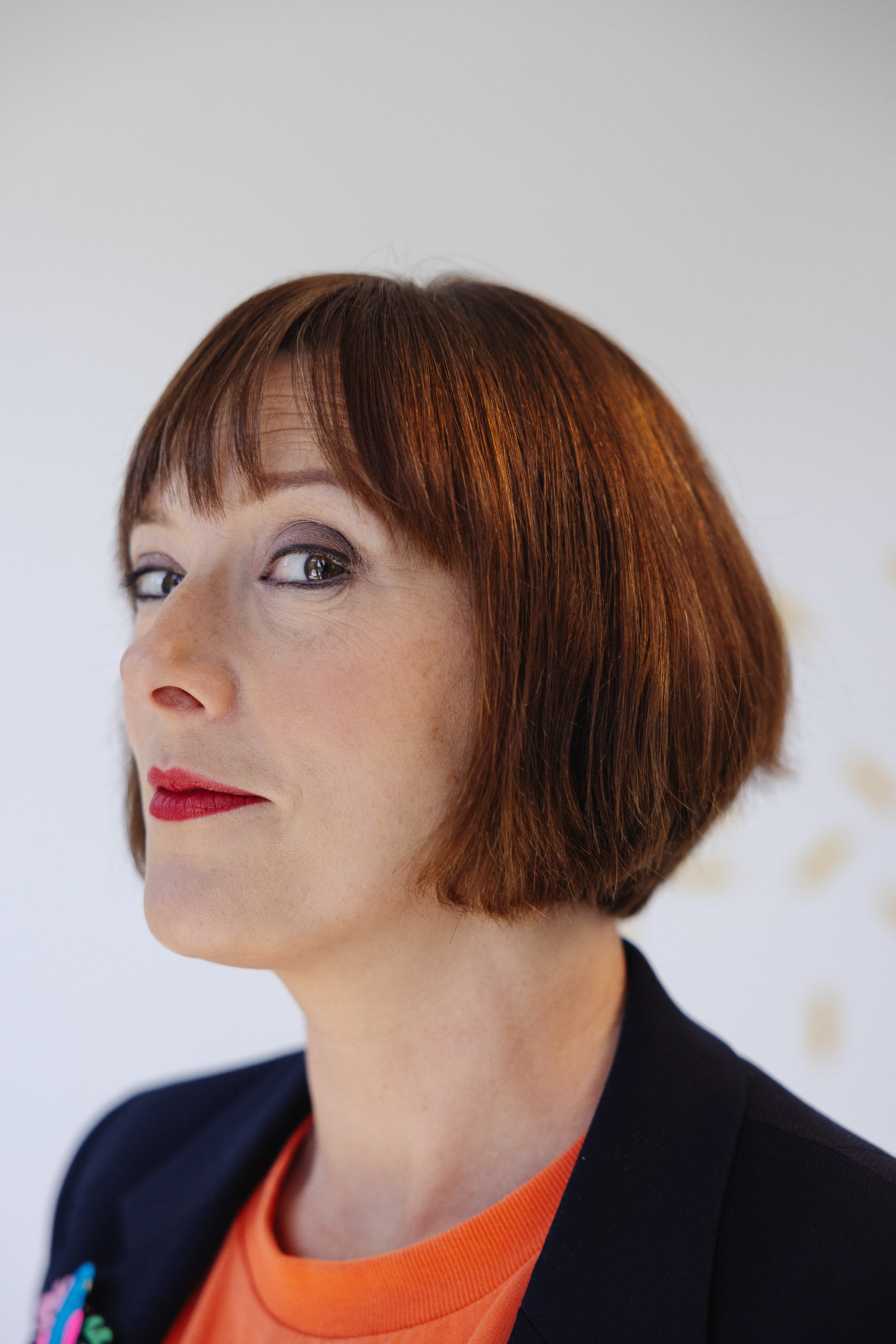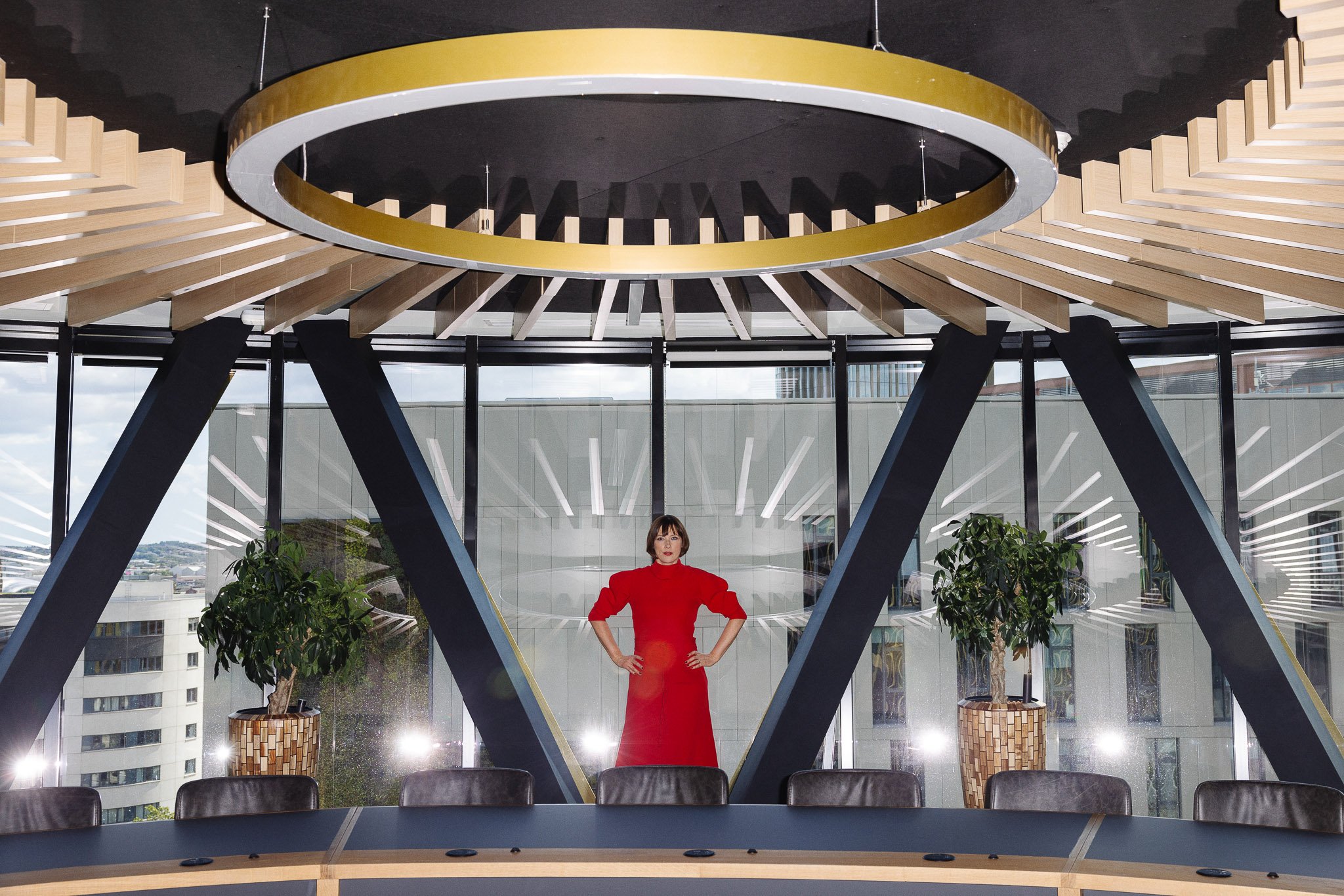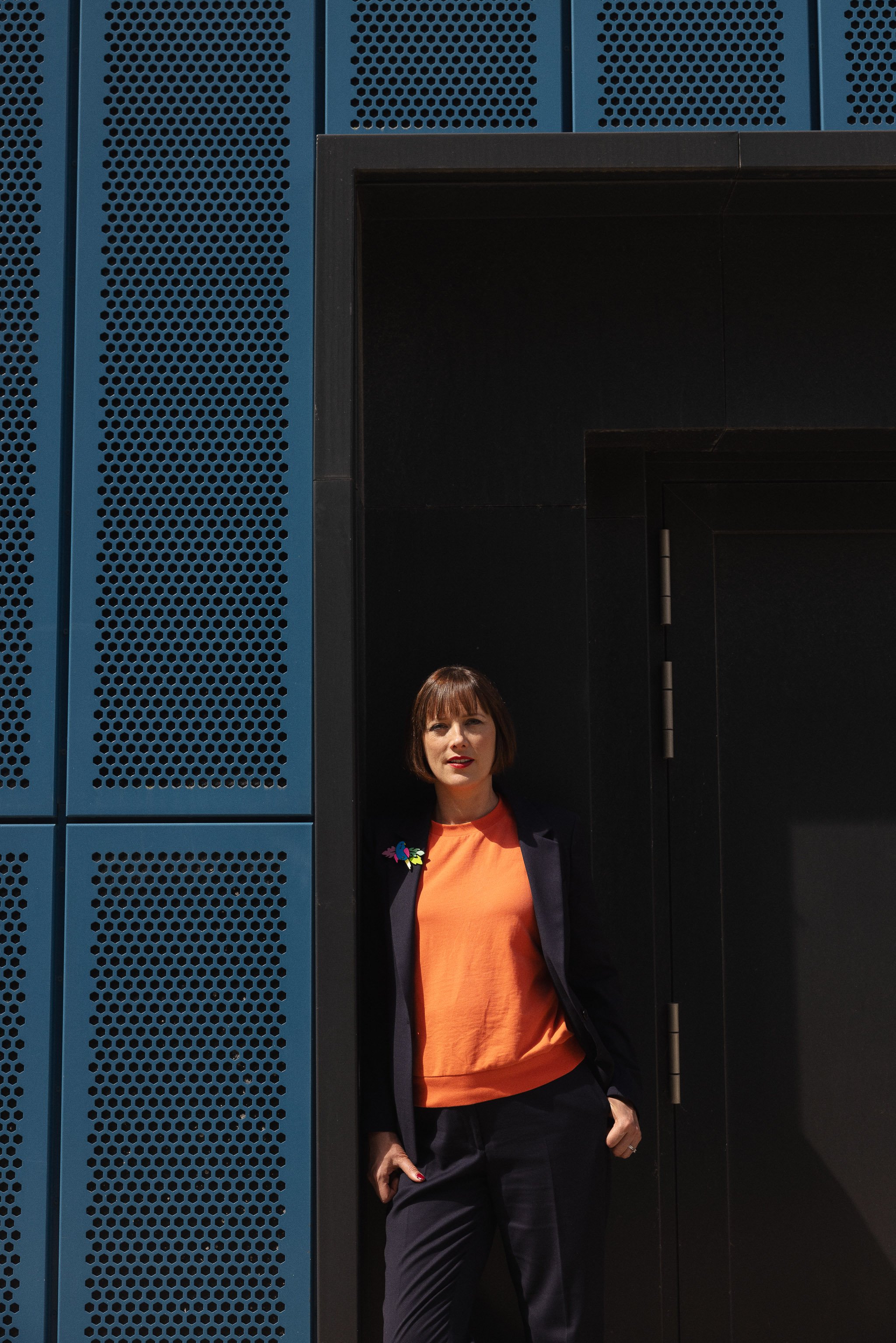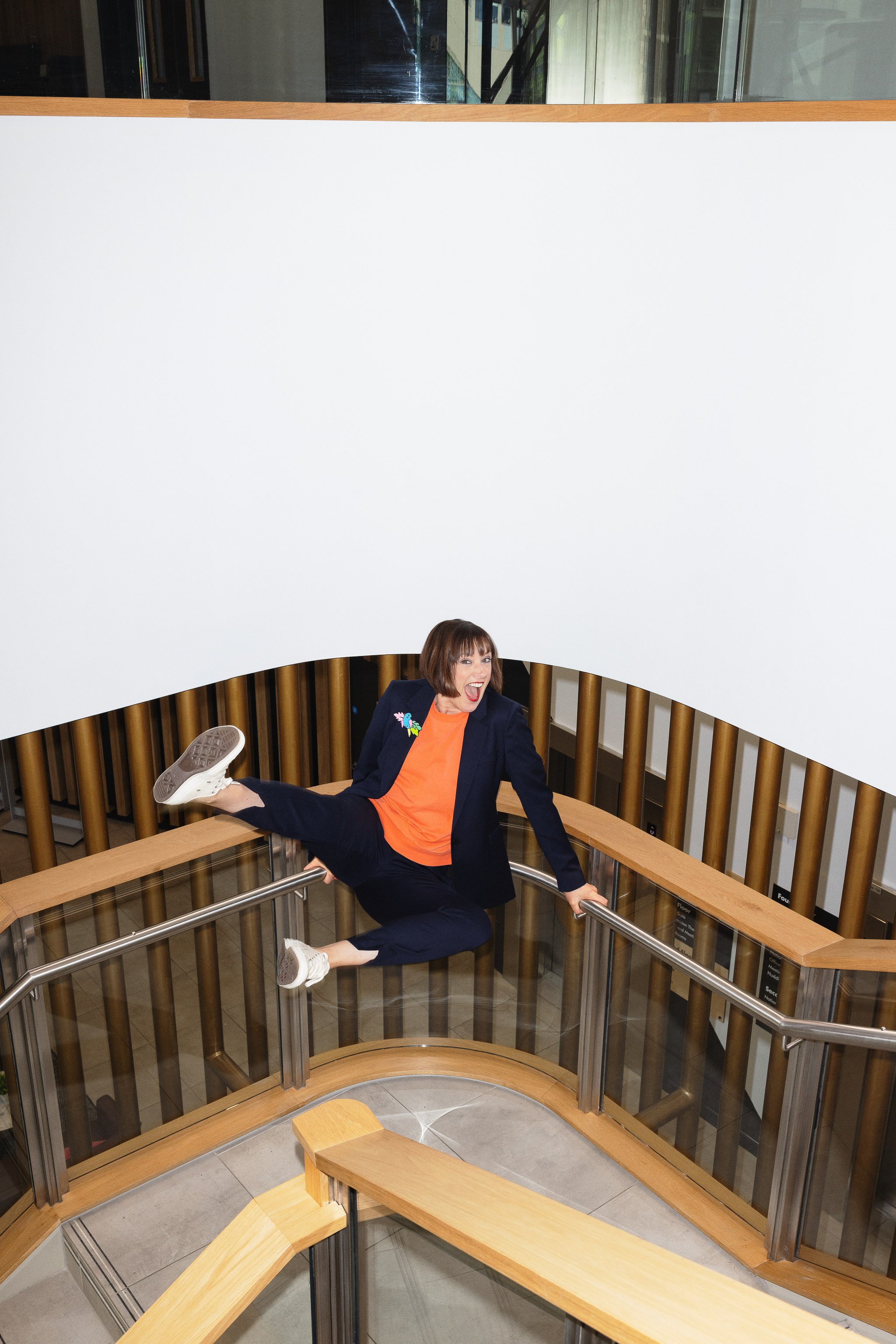Chatting with Charlie
Charlie Charlton
Charlie Charlton tells stories for a living, and encourages other people to tell theirs too. After nearly twenty years with the BBC as a senior journalist and broadcaster, she’s now Community Engagement Manager for Newcastle Helix and a freelancer who has worked with business organisations and the public sector. We spoke to her to find out why storytelling is important for the North East.
Interview by Arlen Pettitt
Photographs by Christopher Owens
I meet Charlie Charlton in The Catalyst on the Newcastle Helix site.
The Catalyst is an impressive building with a sort of honeycomb look to it on the outside, and the feel of a Scandi theatre or opera house on the inside.
It's one of a set of buildings on the 24 acre Helix site, with names like The Core, The Spark and The Lumen.
The site is a joint venture between Newcastle City Council, Newcastle University and Legal & General.
It exists as an innovation hub.
The Catalyst is home to two national innovation centres, one for data and one for ageing, and the surrounding buildings play host to a mix of researchers, labs, start-ups and large established businesses.
The trick to innovation is getting them to mix and collaborate.
That's where Charlton comes in.
"When I came here, the idea was to help build this ecosystem," she explains. "You’ve got this amazing site which is unique, all this beautiful architecture, but what was going on behind the doors? Nobody really knew."
She was tasked with telling stories and providing opportunities for people to meet and hear from one another.
"I love ‘live’, I’ve always loved live, I presumed it was live radio and live TV, but actually it can be live events and live relationships"
It's a natural fit for someone who, with the BBC, talked to people and told stories for nearly twenty years, including almost a decade hosting BBC Newcastle's breakfast show, and five years working on prime-time shows for BBC Radio 5 Live.
When she left the BBC, Charlton unexpectedly found the region opening up for her.
“I feel like we’re on the cusp of something completely new and exciting,” she says. “Something different is happening, and I wondered whether it was because I’d left the BBC and suddenly I was having a completely different outlook, not changing who I was but refreshed conversations, different relationships, more openness.”
It’s a huge transition to leave any employer, especially after that length of time, and especially when it’s a national institution like the BBC, and it’s clear Charlton still carries a great deal of fondness for her time there, especially for her former colleagues, as well as a tinge of sadness.
She recalls a conversation with an old boss where the topic of her potential exit came up, and remembers telling him “I don’t want to be a press officer, I don’t want to be a marketer, I don’t know what to do, I love being a broadcast journalist.”
As it happened, later that same week the opportunity came her way that turned into the role with Newcastle Helix. That offered an exit on her terms, into an interesting new role that left behind some of the shackles of life at a national public broadcaster.
“When I came here,” she says, “I thought I can just push everybody else’s stories and be editorially free, not continually needing to balance ‘oh this company has done some fantastic work in the life sciences, however, this other company in Bury has been doing something similar and let’s be fair to them’. I could just flog it and go for it and give it everything.”
I put it to Charlie that she’d evolved in what she wanted to be doing and that, by the time she left, her and the BBC maybe weren’t well aligned anymore.
“Tooootally,” she says, drawing out the word with a bit of trademark broadcaster’s inflection.
“I was ready to leave daily news,” she continues, “I don’t miss it. I love ‘live’, I’ve always loved live, I presumed it was live radio and live TV, but actually it can be live events and live relationships.”


Somewhat inevitably, the loss of alignment Charlton felt appears to have coincided with her becoming a mother - she has a six year old and a two year old - and while she has changed as a person and a professional, the BBC wasn’t capable of that as an employer.
But now the rigidity of broadcasting - tied to strict, predictable hours and ten years of 3.30am starts - has given way to the flexibility of freelancing alongside her Helix role, but it has left its mark on Charlie’s approach to work.
“One thing I hadn’t realised was my workrate,” she says. “It’s very high, and I just wouldn’t have noticed, because everything was by the clock. You were on-air permanently, having to juggle this stuff, and I kind of kept that.”
As we talk, we come back a couple of times to this idea of workplace 'superpowers' - something that gives you a leg up, whether it's your work rate, or your particular experience or an unusual combination of skills.
Charlie Charlton's superpower is that she is exactly as curious, enthusiastic and energetic as her on-air persona would have you believe.
There doesn't seem to be an inauthentic molecule in her being. She is - simply, straightforwardly - what she is.
That allows her to build a quick rapport with people - I see her do it four or five times just in an hour or so in The Catalyst cafe - and her genuine interest no doubt helps coax out Helix's innovation tales.
"I am a complete luddite," she says. "I was not good at science at school, and yet I’m here on an innovation site. So I go in as a curious child slash village idiot - whichever you want to call it - and the deal is we need to find a way of you explaining what it is you do to me and if you can’t explain it to me, it won’t reach my 80 year old mum Mavis, and it won’t reach my pre-school children."
"If you do find that way," she continues, "that’s when something major can change, because that’s the way you get the support of the North East public."
“Newcastle, or the North East, as the Goldilocks region. I think it is just the right size.”


Her BBC training has played an important role in being able to tell Helix’s stories effectively and in an accessible way.
“If you imagine for an average piece on network radio, you’ve got three minutes,” she explains. “You were lucky if you got the longer slot with the Prime Minister, and that would be seven minutes. The average person talks three words a second, and you’re the Prime Minister, think of all the issues you want to get through in that time. The pauses, the thoughts, the backtracking. Your questions have got to be pointed, you’ve got to have done your research, all of those things are completely invaluable.”
The trick, helped by the “very patient” academics she’s often speaking with, is to find three key facts and identify something people will connect with emotionally.
That connection is important, because Charlton talks about the North East's people as the region's key asset, and so chiming with them unlocks the support they provide and the communities which grow quickly in the region.
"It’s the Goldilocks city," she says. "Newcastle, or the North East, as the Goldilocks region. I think it is just the right size."
Charlton occasionally uses 'Newcastle' and 'the North East' interchangeably, but not with any sense of an erasure of the rest of the region, more as a reflection of her role on a prime location in the city, a site with an international profile, and in recognition that Newcastle Helix can play a part as a vehicle for the wider region.
"There’s a benefit of being proud of where you’re from," she says, "knowing all the values and how intrinsically different it is. How different Newcastle is to Gateshead, or Newcastle to Sunderland - that’s wonderful, identity is something to be celebrated. But, I think that if you develop this overarching power together, our area is capable of amazing stuff."
A degree of unity is necessary when you're a region trying to increase the volume of its voice, as is a degree of pragmatism.
"I think you can go and celebrate our region and celebrate the people but you’ve still got to ask those holding to account questions," Charlton says. "You’re not having a pop at somebody. Unless we work out these issues, and unless we’re honest about the problems, we’re not going to get there. Positive realism, that’s what I aim for."
I suggest failing to be realistic means approaching problems as you'd wish them to be, rather than as they are. Charlton nods, enthusiastically.
"...or the problems as they were," she adds, "which is a major issue I think, particularly for the North East, where depending who’s leading the conversation it’s stepped back."
"I felt that a lot with a lot of politicians I interviewed for decades at the BBC," she continues, "where they were because of the areas they were representing they were on a path where they were still talking about the impact of heavy industry and all the rest of it. It’s not to say that’s not important, but what are the solutions now, in 2023, that are potentially very different?"
Charlie sees and feels this change in her interactions with businesses and young people in the region.
“We’ve got devo round the corner,” she says, “there is a post-pandemic movement where people have different priorities now as individuals and companies, and you piece all these little bits in the jigsaw together. Companies pushing for better ESG, whether they are doing that just for their share prices or whatever it’s still happening. The tech recruiters I speak to are saying people are going through the interviews and at the final stage they’re asking where you sourced your furniture from and if you don’t give the right answer, they won’t go for the job. That’s unheard of, people deciding what they want to do with their life, having a social conscience.”
That shifting relationship with work is something which has been a theme of the events Charlton runs at Newcastle Helix, which have included sessions on attracting and retaining staff, decarbonising your life and whether workplaces should be pet-friendly. An upcoming event will tackle support for working parents.
“I created a format which meant that it was completely non-hierarchical,” Charlie says, “there were no daft questions. We invested in a little mic ball, so would create panels or fireside chats, and then I would ‘produce’ parts of the audience, because there were some people I realised who I were really happy to tell their stories and would happily sit for 40 minutes and talk, and other people who had something really important to say but were introverts or didn’t see their value, didn’t feel comfortable.”
The idea was that everybody would have a space to contribute - even if just for a minute - and that meant everyone would go away with more knowledge about their neighbours on the Helix site and in the wider community.
Event hosting is also a strand of Charlton’s freelance work, and she’s worked on conferences and award ceremonies with clients like the Entrepreneur’s Forum, the Chamber of Commerce and the North of Tyne Combined Authority.
The Combined Authority were partners on another event, Building Blocks, which was hosted at The Catalyst and saw 180 schoolchildren fill the building for a day of workshops aimed at boosting interest in tech and coding, and opening eyes to the career opportunities on their doorstep.
“This place [Newcastle Helix] is bang next to Arthur’s Hill, and there’s no integration,” Charlie explains, “which I don’t like, and I don’t want that to be the case. So we reached out to those schools and everybody wanted to get involved.”
The event was organised with the education team at the Combined Authority, who Charlton describes as a “dream to work with”, and the feedback from the event was brilliant.
“One teacher said they [the pupils] hadn’t learned as much in a year as they had in that morning, just for a little venture into the real world of work,” Charlton says.
It’s very much a passion project for Charlie to work on developing the region’s talent pipeline, and create opportunities for kids to experience the world of work. She can track it back to one specific interaction.
“It came from years ago when I was hosting a conference and this lady came up to me and asked for a word,” she recalls. “She worked for an arms-length careers service and she went to a college in Peterlee, with a wodge of paper on tech stuff, because that’s what she thought they’d all want to do.
Out of a year group of 80,” Charlie continues, “three chose tech. The majority went for leisure and retail because they could see the swimming pool, the football ground and the shops. What they couldn’t see was drone manufacturers, games companies; they just didn’t know it existed. She started to ask them what they were doing at the weekend and they said ‘flying drones, playing games’, and that is insane, because you talk to the businesses and they are desperate for these new people coming through. This has to be joined up.”


“There’s a lot out there, it just needs people to go digging for the stories, get them out and communicate them to people in the right way”
She got her own taste for business at a young age, growing up with two parents running their own businesses.
“My dad was an industrial supplier when all the shipyards were busy,” she says. “Reconditioned boilersuits. My dad was the UK’s biggest recon boilersuit seller, so we used to rope in our whole street in the summer. The summer was come in our garage and wrap up boilersuits in masking tape, literally.”
Her mum, remarkably, ran a truck company.
“It was a coal company for years and years and years,” Charlie remembers, “and had to morph into something else, so it was heavy haulage.”
“It’s the only place I’ve ever been sacked by…by my mother,” she says, perhaps still shocked. “I went to an Asian festival and got henna put on my arm, and she took us in - me and my best mate - ‘Right girls, we don’t allow visible tattoos, and I’m afraid that is what you have done.’ ‘It’s henna, it’s gonna come off!’ ‘Well, you can’t work here until it’s gone’, and that was the end of that summer job.”
Family and purpose are both clearly very important to Charlton, and when we talk about the variety of work in the region, she mentions her brother.
“My brother’s an adult carer. Loves his job,” she says. “Is it well paid? Shockingly, disgustingly, no. But is he looking after the most vulnerable in society? Yes. Does he love it? Yes. And there’s your value. So, whatever you go and choose to do, just find a sense of satisfaction.”
If the region is to grow, we’ll all have to find some of that. We’ll need eyes opened and horizons broadened. For that, we’ll need some stories.
“There’s a lot out there,” Charlie says, “it just needs people to go digging for the stories, get them out and communicate them to people in the right way.”





